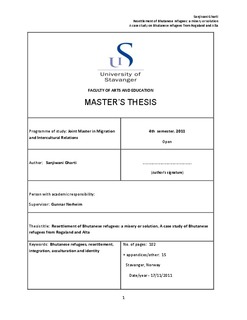| dc.description.abstract | Being a refugee from a different culture, tradition and religion, Bhutanese refugees face difficulties in adjusting to a new country and a new environment. The objective of this research was to explore the conditions and quality of the life of Bhutanese refugees that have resettled in Norway and as important has been to make a comparison about the experience of those that first settled in Nepal and then resettled in Norway. To what degree have they been successfully integrated in Norwegian society? Primary data has been collected through available literature in data bases and libraries. The refugees living in Rogaland was selected for most of the interviews. The questionnaires were filled out by Bhutanese refugees living in Alta. All together 27 Bhutanese refugees were interviewed, and 2 were questioned through a questionnaire.
The majority of the Bhutanese are in the 36 to 45 years age group. Many of them are taking introductory courses dealing with the Norwegian society and language. Young Bhutanese refugees are more strongly affected by an acculturation process than older people. Based on the Migration Integration Policy Index (2007), the integration of Bhutanese refugees is measured in relation to family unification, long-term residency, anti-discrimination, access to labor markets, political participation, education and access to nationality. Most of these criteria have been used in connection with the respondents in this study that are resettled in Norway along with family members. The majorities of the respondents are dependent on financial support from their respective municipalities for their daily expenses and most are not able to save money. Even though they cannot save money, they are satisfied with the amount they earn or the support they get from the municipality. None of the Bhutanese refugees are politically active at the present. Nine of the Bhutanese refugees were attending the normal Norwegian school, while the remaining ones were going to language training classes. Three respondents felt that they were discriminated against because they had problems getting access to the labor market. Most Bhutanese refugees have some Norwegian friends, and they are participating in social events. Bhutanese people are very religious people, and therefore freedom of religion is needed for their integration at the same time as freedom of speech makes their integration more successful.
The Bhutanese refugees that have been resettled in Norway show a high degree of satisfaction. They have access to facilities such as housing, clothing, education, the labor market, citizenship, etc., in Norway to a degree that they could not dream of having access to in Nepal. Most are eager to integrate into the Norwegian society, which they think will bring them more advantages and satisfaction. On the one hand, they certainly miss Nepal and their original culture, their relatives and also the Nepali speaking people from Nepal. Bhutanese refugees in Nepal do not look upon their resettlement in Norway as misery but as a solution to their miserable life in the refugee camps. Here, however, it is necessary to add that the relative few numbers of interviews and the few questionnaires received make it a little risky to make a bold final conclusion. It will take some more years before it is possible to evaluate if the resettlement in Norway was a good solution in the long run. Nevertheless, this study casts important light on a small and little know group of refugees in Norway, and the new knowledge presented here is of great value in itself. Considering that an overwhelming majority of Bhutanese refugees are very content with their new life in Norway and the help they get from the Norwegian government as well as the municipalities, reflects positively on the different kind of practices the Norwegian government are willing to use to accommodate refugees in Norway. | no_NO |
